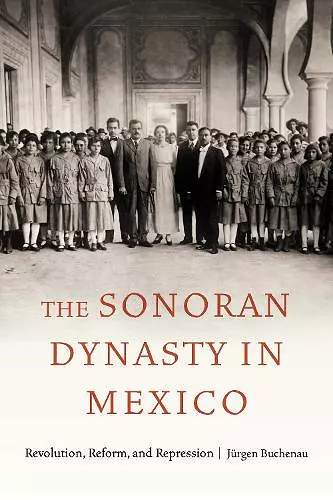The Sonoran Dynasty in Mexico
Revolution, Reform, and Repression
Format:Hardback
Publisher:University of Nebraska Press
Published:1st Nov '23
Currently unavailable, and unfortunately no date known when it will be back

Honorable Mention for the 2024 SECOLAS Alfred B. Thomas Book Award
Two generals from the northwestern state of Sonora, Álvaro Obregón and Plutarco Elías Calles, dominated Mexico between 1920 and 1934, having risen to prominence in the course of the Mexican Revolution. Torn between popular demands for ending the privileges of wealthy foreign investors and opposition by a hawkish U.S. administration and enemies at home, the two generals and their allies from their home state mixed radical rhetoric with the accommodation of entrenched interests.
In The Sonoran Dynasty in Mexico Jürgen Buchenau tells the story of this ruling group, which rejected the Indigenous and Catholic past during the decades of the revolution and aimed to reinvent Mexico along the lines of the modern and secular societies in western Europe and the United States. In addition to Obregón and Calles, the Sonoran Dynasty included Adolfo de la Huerta and Abelardo L. Rodríguez, four Sonorans among six presidents in less than two decades. Although the group began with the common aims of nationalism, modernization, central political control, and enrichment, Buchenau argues that this group progressively fell apart in a series of bloody conflicts that reflected broader economic, political, and social disagreements. By analyzing the dynasty from its origins through its eventual downfall, Buchenau presents an innovative look at the negotiation of power and state formation in revolutionary Mexico.
"The Sonoran Dynasty should become a required text for established scholars to help them avoid the myths that have grown up around Álvaro Obregón and Plutarco Elías Calles and to better understand the wider Sonoran circle of associates."—Jason H. Dormady, A Contra Corriente
“The Sonoran Dynasty in Mexico is a major contribution to the field. As Jürgen Buchenau points out, the Mexican Revolution, in contrast to other modern revolutions, had no overriding ideology, though it did produce a progressive, nationalist constitution. That meant that the priorities of Mexico’s leaders during the 1920s—the crucial period of reconstruction following a bloody ten-year civil war—would determine what ‘the revolution’ meant as they selectively enforced or disregarded the provisions of the constitution. Understanding those priorities is vital to understanding the modern history of Mexico. Buchenau illuminates that theme in an insightful and compelling narrative.”—Timothy J. Henderson, author of The Mexican Wars for Independence: A History
ISBN: 9781496236135
Dimensions: unknown
Weight: unknown
422 pages